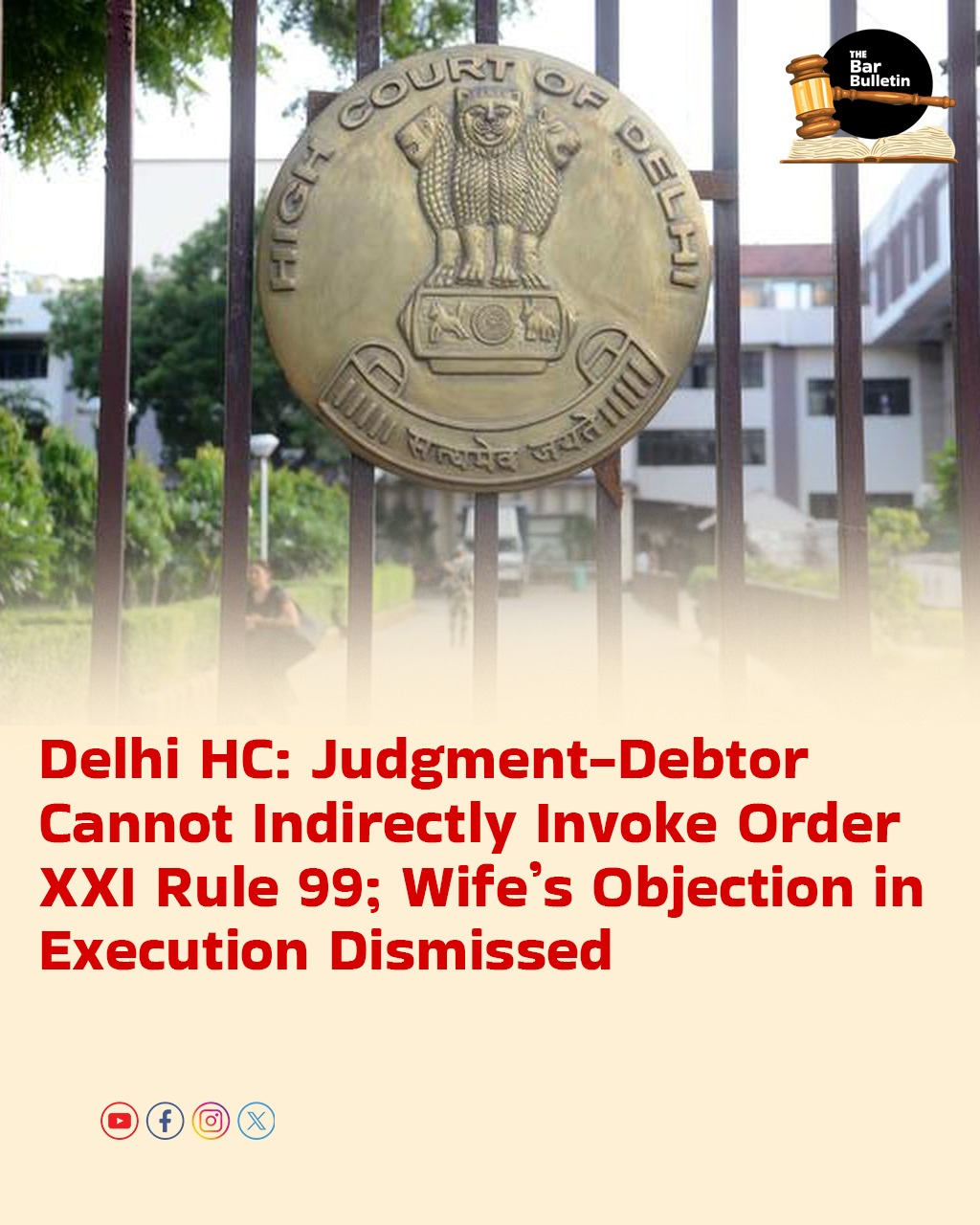The Delhi High Court dismissed a petition filed by the wife of the judgment-debtor, challenging the dismissal of her objection application under Order XXI Rule 99 CPC. Justice Manoj Jain upheld the executing court’s decision, observing that what cannot be done directly cannot be permitted to be done indirectly.
The dispute revolves around a suit filed in 2022 seeking possession, injunction and damages for a property situated at Qutub Vihar, Phase-I, New Delhi. It was submitted that the plaintiff was the absolute and sole owner of the property, having purchased it in May 2019 from a prior purchaser, who in turn had bought it from the judgment-debtor’s wife in May 2016. Though the defendant was duly served, he did not defend the matter or file any written statement, which eventually resulted in a decree being passed in favour of the plaintiff for possession of the suit property. This decree was challenged by the judgment-debtor in a Regular First Appeal before the District Judge, which was dismissed, and his Regular Second Appeal remains pending adjudication.
The petitioner contended that the Executing Court should have decided her objection petition on merits instead of discarding it as premature, relying on Brahmdeo Chaudhary v. Rishikesh Prasad Jaiswal (1997) 3 SCC 694 to submit that objections could be entertained even if she continued in possession. On the other hand, the respondent/decree-holder, placing reliance on Periyammal v. V. Rajamani, 2025 SCC OnLine SC 507) and Silverline Forum Pvt. Ltd. v. Rajiv Trust (1998) 3 SCC 723, contended that a third party can raise objections only after being dispossessed.
The Court observed that the objection application under Order XXI Rule 99 CPC had been filed by the wife of the judgment-debtor with the claim that the decree had been obtained by fraud. She alleged that the decree-holder was part of a gang of land grabbers whose modus operandi was to acquire property documents under the garb of mortgage and then transfer them illegally. The Court, however, found the objection meritless, since the documents in question had been executed by the petitioner herself in 2016, and if they were fraudulent, she or her husband could have challenged them earlier. She had already filed a separate substantive suit challenging those very documents, and in such circumstances, the execution petition could not be entertained.
However, Justice Jain noted that the provision i.e. Order XXI Rule 99 CPC was meant for a third party i.e. stranger to a decree, and a judgment-debtor cannot make use of the aforesaid provision. When asked, the petitioner submitted that there was no matrimonial discord between petitioner and her husband, making it manifest that the objection application was, for all purposes, at the behest of her husband only. It was further observed by the Court that for totally unexplained reasons, the suit had not been defended by her husband and a one-sided decree was suffered, and such an objector could not be permitted to raise grievance of having any independent right to maintain the same as a third party, when the strings were being pulled by her husband who was the judgment-debtor. Therefore, the Court did not find any real requirement of interfering with the impugned order and the petition was accordingly dismissed.
Cases relied on:
Brahmdeo Chaudhary v. Rishikesh Prasad Jaiswal (1997) 3 SCC 694
Periyammal v. V. Rajamani, 2025 SCC OnLine SC 507
Silverline Forum Pvt. Ltd. v. Rajiv Trust (1998) 3 SCC 723
Appearances:
Petitioner: Mr. Krishna Chandra Dubey, Mr. Ashok Kr. Singh, Mr. Abhishek Agarwal and Ms. Uma Tarafdar, Advocates
Respondent: Mr. Akil Rataeeya and Mr. Movish Lohia, Advocates

